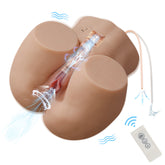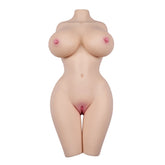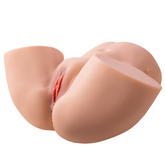Can buying a child-like sex doll torso make you a pedophile?
A pedophile is defined as someone who adheres to a sexual orientation towards children, especially those aged 13 or younger. The American Psychiatric Association (APA) has included pedophilia as a mental disorder since 1968. As far as the APA is concerned, pedophilia is defined as individuals who have sexually arousing fantasies, sexual urges, or behaviors involving children. Some studies argue that engaging in sexual activities with a child-like sex doll torso promotes and normalizes dishonest forms of sexual activity.
Due to recent scandals involving famous people, pedophilia is one of the psychiatric disorders known to the general public. Unfortunately, just to justify their behavior, they rationalize and normalize their sexual interactions with children – and this for at least 6 months.
Studies show that most pedophiles are men, as it is estimated that there is a 10 to 1 ratio of male to female minor molesters. This is the result of damaging sexual relationships between boys and adult women.
The Diagnostic and Statistical Manual of Mental Disorders states that true pedophiles show a specific arousal and have repeated sexual encounters with children.
A mother from the US experienced her daughter's photo being stolen and copied her child's image and sold it as a child-like TPE sex doll torso. She was shocked to find that the sex doll torso resembled her 8-year-old daughter and was being sold on Amazon. However, it took a full four days for the sex doll torso to be removed from Amazon - and this has caused a lot of emotional damage not only to the child but also to her family.
Some pedophiles realize that engaging sexually with a child is usually wrong - leaving them frustrated, isolated, depressed, lonely and anxious. But that doesn't mean being a pedophile is an excuse for mental incapacity.

What are the legal risks of owning child-like sex doll torsos?
Unfortunately, owning realistic sex doll torsos is legal in the United States, but many have banned them in the U.S. through the Creeper Act of 2017. The law aims to block the importation and transportation of child-like dolls, mannequins, or robots intended to be used in sexual acts. The normalization of this type of work suggests that owning dolls influences the promotion of sexual violence and abuse, which is also defined as pedophilia.
However, recent analysis emphasizes that there is no concrete evidence that owning realistic sex doll torsos rises to levels of sexual objectification. But morally speaking, it is an actual lack of respect towards women and especially children. Some philosophical writers have discussed the possibility of sex doll torsos for children giving them the satisfaction of gaining sexual gratification, dominance, power and control over women.
These misconducts do not prevent the sexual abuse of children and women, said Michael Bourke, Ph.D., who has worked with sex offenders in the federal prison system. He also said that the use of realistic sex doll torsos satisfies the fantasies of pedophiles in a more real way.









